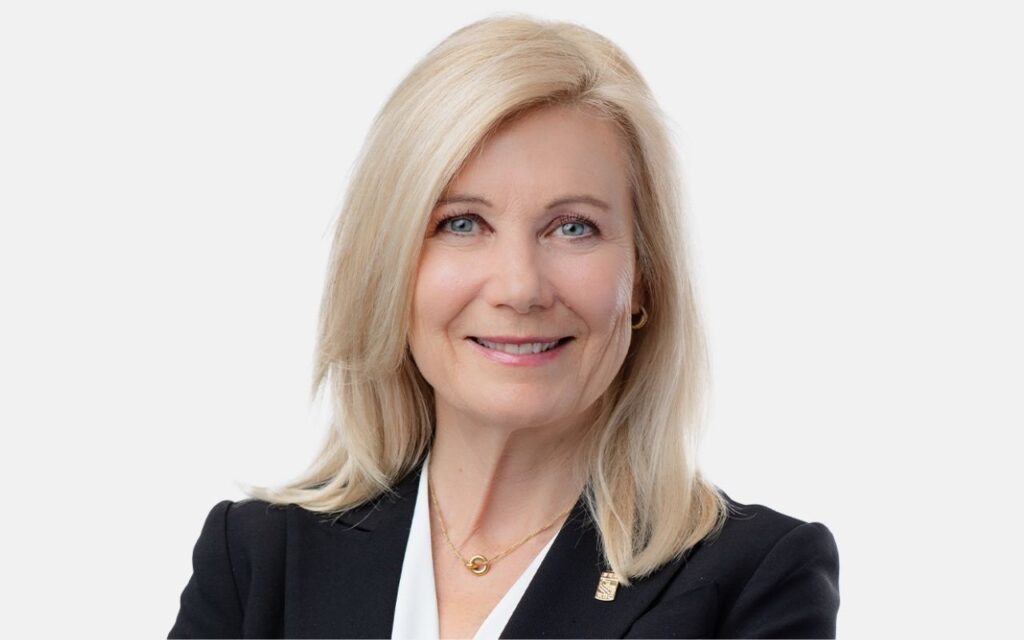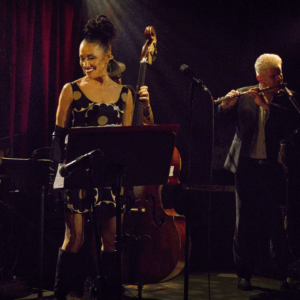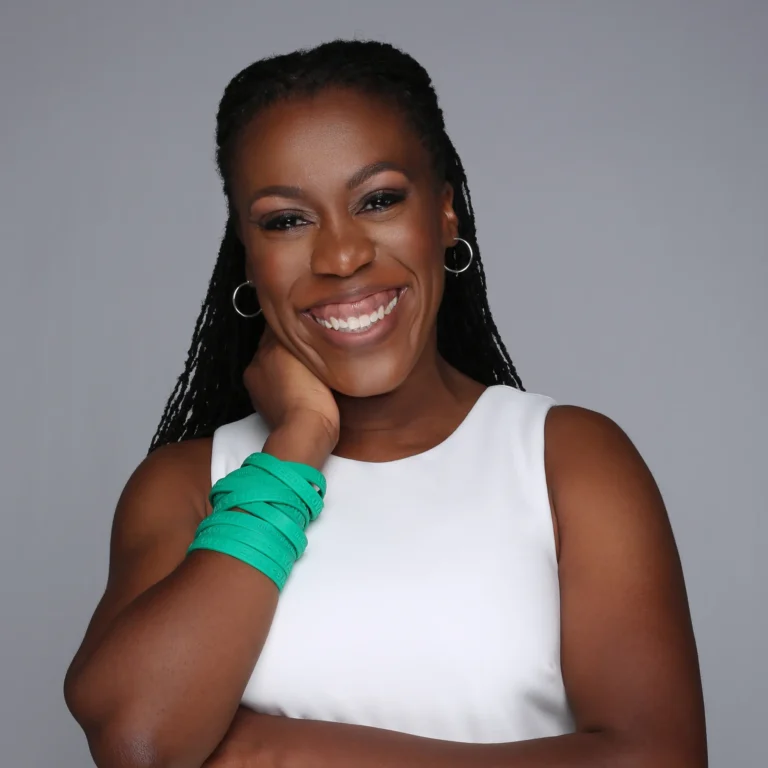RBC’s Kim Mason chats leadership, reinvention, and the power of accepting help
From starting out at RBC to becoming Executive VP and Head of Private Banking, Kim Mason has climbed the corporate ladder with purpose – and more than a few reinventions along the way.
She’s been named one of Canada’s Most Powerful Women, a Top 50 CEO by Atlantic Business Magazine, and one of Canada’s Top 25 Women of Influence.
In this episode, Kim joins us to talk about career growth, what reinvention really looks like – and the values that keep her grounded at the top.

Catherine Clark: We really appreciate you taking the time to speak with us, especially with such a busy career. It’s kind of astonishing, in this day and age, that you’ve been at RBC for about 30 years. When you were first starting out, did you have any sense that you’d build your entire career with one organization?
Kim Mason: I definitely did not. And actually – it’s been 37 years, which is hard to believe! But okay, I’ll take 30 if that sounds better. You’re right, Catherine, I absolutely did not plan on spending my whole career with one organization. In fact, I’m a bit of a banker by accident. I went to university to be a journalist. My plan was to travel the world and write about it. I did a dual degree, and the second part was in anthropology, so I was really planning to learn about different cultures and share their stories. But I joined RBC after my first year of university – and that was it. I just fell in love with the culture and the people, and I’ve never looked back.
Jennifer Stewart: Kim, how have you reinvented yourself along the way? Because, like you said, you’ve been at RBC for 37 years. You’ve said yes to a lot of opportunities and managed to keep things fresh. How have you stayed open to change and embraced it throughout your career?
Kim Mason: Thanks, Jen. Well, I think you just hit on it – I’ve said yes, repeatedly. I’ve really trusted the leaders around me. When they saw an opportunity they felt would be a good stretch or aligned with my skills, I tended to believe them. There are only two times in my career I can remember saying no to an opportunity, and in both cases, I had specific reasons. But not long after declining, another opportunity came along.
Looking back now, with all the years of experience and perspective, I think it was as much about the bank’s approach to talent planning and succession as it was about keeping me moving. It wasn’t just about the role I was going to – it was about continuous growth. I think that’s really important for any organization that wants to develop talent: they need to expose people to new challenges early in their careers. And I’ve definitely benefited from that throughout mine.
Catherine Clark: I love that you said no – because that’s something we’ve heard from other guests as well. Some have shared that they feared saying no to an opportunity would be the end of the road for their career. But you said no twice, and still, more opportunities came along. I think that’s a really powerful message for women to hear.
Kim Mason: It’s interesting you say that, Catherine, because in both cases, my reasons for saying no were more about family and personal safety than about the job itself. One of the opportunities involved relocating – and I had already relocated across the country once before. This time, it would have meant moving outside of Canada. There were some aspects of that move I felt uncomfortable with, especially since I had two young teenage daughters at the time. It just didn’t feel like the right moment.
I was very careful to frame the decision respectfully and clearly explain my reasons. And as I mentioned earlier, another tremendous opportunity came along soon after. I truly don’t think saying no set me back in any way. But I do think how you handle that “no” – being thoughtful and transparent about your reasoning – is incredibly important for all of us.
Jennifer Stewart: Kim, can you talk to us about the time you did relocate your family? You mentioned earlier that you said no to one opportunity, but you had gone through a move before. You’ve got two kids, a partner – what was that experience like?
Kim Mason: Relocating and taking my family across the country – from Ontario to Atlantic Canada – was one of those moments I look back on as a true turning point in my career. It was definitely a shift in my trajectory.
It meant starting from scratch. You spend years building a reputation, especially in leadership roles, and with each step, you gain a following and a sense of momentum. But when you step outside that comfort zone and take on a role in a completely new environment – where no one knows you or your track record – it really puts everything to the test. Your new team is reading about you in a company announcement, and that’s it. So yes, it takes courage to embrace that kind of “start-from-scratch” opportunity – but what comes out of it is tremendous confidence.
As a family, we leaned into it. It was tough on my kids, to be honest. And ironically, when we eventually moved back to Ontario, they cried even more about leaving! So in the end, the change turned out to be a really positive experience for them too.
You really have to look at it through the lens of growth: What could this lead to? What can we all gain from it? And for all four of our kids, it was a tremendous growth opportunity. It was also one for my husband – he stepped into a different kind of role, supporting them more directly. And for me, it was grounding. It gave me a whole new level of confidence – proving to myself that I could succeed in a role not because of who I had been in previous positions, but because of who I was becoming.
Catherine Clark: I imagine that move probably pushed your family in a big way. Anyone who’s been through a move knows how tough it is – you have to adjust to new people, new surroundings, new everything. It’s hard. How have you managed to strike that balance between the personal and the professional successfully?
Kim Mason: Yeah, thanks, Catherine. It’s such an interesting question because I know, for everyone, it’s very personal. For me, I grew up with a stay-at-home mom who was, you know, exactly what you would have seen in movies – or at least what I saw in movies growing up. She took care of my brothers and me, she took care of my dad – we wanted for nothing. She was an amazing cook. So I always felt I had to also fulfill that image while having a career.
And it took me a long time to learn that it’s okay to accept help. I mean, honestly, I used to say, “When I reach this level, I’m going to get a cleaning lady,” and I just kept putting that off. Or, “When I reach this level, I’m going to do that,” and I kept putting those milestones off, feeling that I needed to be superhuman – until I couldn’t.
So I would say this theme of acceptance really became part of how I began to lead when we moved out to Atlantic Canada. I spent a lot of time on airplanes, traveling across all four provinces, and I needed to step back and rely on my husband – and not feel guilty about the fact that he was stepping more into the parenting role. That was tough. That was tough reflection. But it was also liberating for our family.
Because with him stepping in, there’s definitely a closeness between my husband and our children – but there’s also this sense that it’s okay: in a household, everybody participates, everybody plays a role. And it lifted a lot of stress off my shoulders about what I needed to do.
It also meant that on weekends, I had to set firm guardrails for myself around how much my nose was in my laptop or in reading. When I was committed to my family, I was committed to my family. And when I was taking an hour to go and do some work, I’d just go and do that. But I think I learned a lot about being disciplined with family time versus work time – and also about how to accept help. Because I did need it. And it was good for all of us.
Catherine Clark: One thing I find really interesting is that a lot of women downplay the fact that they’re women, because they don’t want that to be the defining element of their career success. But you’ve also tried to balance that with acknowledging the unique challenges women face. How have you managed to strike that balance – while also supporting other women around you?
Kim Mason: Well, I won’t say I’m, you know, perfect. It took me a long time, Catherine.
First of all, when we moved out to Atlantic Canada, I was the first woman SVP for any of the banks. I’m very proud to say that when I left, four of the five major banks there were represented by women in senior roles – in the most senior roles. So that was a really good thing.
But in the beginning, it was new. There was a lot of focus on, “Oh, RBC has a new SVP head of the Atlantic region – and it’s a woman.” I was asked to do a lot of speaking engagements because of that, and honestly, I was uncomfortable with it at first. I leaned into substance. I really wanted to make sure that when I showed up at an event or represented RBC somewhere, my brand was one of experience and credibility – that I’d earned my place, not that I was there because I was a woman.
But then something shifted. I realized I was missing an opportunity – to inspire another generation of women, to help them learn from the things I’d done wrong, like resisting help for so long. I started to bring more openness to my conversations, saying things like, “This was really hard – here’s what I learned. If I can help you, I want to.”
So I really began to open up my support for women. I took on more female mentees. I did eventually lean into that speaking circuit a bit. And when I left the region, I remember being asked to speak at an event and sharing five themes of acceptance – truths that had taken me a while to come to terms with. But it felt easy to talk about them, because in the end, they’re what helped me progress and continue to move forward in my career.
So it took me time to feel comfortable with it, but once I did, it became a passion – and that continues today. Of all the individuals I mentor actively, probably 20% are men and 80% are women. It’s not because I don’t want to support men – some of my biggest supporters in my career have actually been men, including my father. But I think sometimes, sharing your own personal experiences and trusting that your advice might help someone else – that can be incredibly powerful.
Jennifer Stewart: What’s the biggest piece of advice you share with a young woman just starting her career?
Kim Mason: Lean into her strengths. That’s the biggest one. It was advice given to me years ago by our former CFO, who was an incredibly strong woman – Janice Fukakusa. I’m dating myself – it goes back a few years – but she was incredibly strong.
She said, “Don’t listen to that voice of self-doubt in your head, because you will naturally lean into the areas you need to focus on. But it’s really important to lean into your strengths.” And she also said, “Make sure you understand what those strengths are and how you can play to them in every role you take on – and don’t ever forget to do that.”
So I think that was probably the most helpful piece of advice.
The other one is: stretch. When an opportunity comes to you – in every case that you can – saying yes is important. People are putting that opportunity in front of you because they have confidence in your capability.
So those would be the two. But leaning into your strengths is a really important one. I think we can all learn from that. That little voice in our head can be dangerous sometimes.









